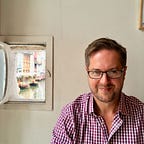Becoming places of Peace:
for each other and the world
“If our thoughts are kind, peaceful and quiet, turned only towards the good, then we influence ourselves and radiate peace all around us — in our family, the whole country, everywhere. When we labour in the fields of the Lord, we create harmony: divine harmony, peace and quiet spread everywhere.”
Elder Thaddeus Vitovnica[1]
Interior peace gives birth to exterior peace. If our thoughts are peaceful, we radiate peace around us, we become places of peace for our neighbour and the world.
As a direct, practical response to the circumstances in our communities that call for greater peace and reconciliation, each of us can commit to the steady, quiet work of establishing greater peace in ourselves.
This is perhaps the most important thing we can do. Everyone around us, our family, the communities we live and work in, our entire society will benefit from this peace.
The contemplative practice of meditation is a simple and profoundly egalitarian way of cultivating interior peace. It’s not the preserve of specialists. It can’t be “owned” by one group or another. Whether we are five years old or ninety-five, have a PhD or cannot read, the wisdom and healing processes of meditation are available to all of us. Everyone can engage in this simple work of peace.
Contemplation is very far from being a mere option for Christians. As Rowan Williams writes, “it is the key to the essence of a renewed humanity that is capable of seeing the world and other subjects in the world with freedom — freedom from self-orientated, acquisitive habits and the distorted understanding that comes from them. To put it boldly, contemplation is the only ultimate answer to the unreal and insane world that our financial systems and our advertising culture and our chaotic and unexamined emotions encourage us to inhabit. To learn contemplative practice is to learn what we need so as to live truthfully and honestly and lovingly. It is a deeply revolutionary matter.”[2]
Contemplative practice turns us towards what comes before words and ideas and notions of identity. Its staring point isn’t “believe this” or “believe that,” but “Come, and you will see.”[3]
A wonderful tale about Rabbi Akiva describes how he was walking along one day, so caught up in his prayer, that he found himself in front of a Roman fort. Above him a voice bellowed down, “Who are you? Why are you here?” Rabbi Akiva, we are told, looked up, saw that the young soldier challenging him was a Jew, and shouted back “Why are you here? If you come and work for me, I’ll pay you double what the Romans are paying you.” The young auxiliary sensibly shouted back, “What do you want me to do for you?” to which the Rabbi replied, “All I want you to do is to wake up before me each morning and when I open my front door, I want you to shout, “Who are you? Why are you here?”
Meditation helps us relax our grip on what we routinely take to be the answers to these questions, so the answer can begin to reveal itself.
Beneath our thoughts, beneath all the narratives we routinely use to say who we are, we discover our common home, where all distinctions and notions of separateness fall away and “there can be neither Jew nor Greek, there can be neither slave nor free, there cannot be male or female, because you are all one in Christ Jesus.[4]
All that obstructs peace in the world arises (in one way or another) from our alienation and estrangement from our true nature. You might say that the greatest cause of conflict between us is our simple ignorance of who we are. The ‘cure’, to paraphrase St. Augustine, comes through the gradual process of being restored to ourselves, to the truth of our shared life in God who is Peace.
As we cultivate greater peace in ourselves, a space of opportunity opens in which to better see those around us, their needs, their mysterious beauty and dignity. As we are healed by the peace that transfigures all that we think divides us and lays bare who we are — members of one family — we become agents of community.
To be restored to ourselves is to be restored to each other.
If we can establish and protect the peace of the Kingdom within us, Elder Thaddeus taught, “People will be attracted by the peace and warmth in us; they will want to be near us, and the atmosphere of heaven will gradually pass on to them. It is not even necessary to speak to people about this. The atmosphere of heaven will radiate from us even when we keep silence or talk about ordinary things. It will radiate from us even though we may not be aware of it.”[5]
We are called to be places of peace, to be the aroma of Christ[6] in the world. Words are optional.
Where do we begin this simple work of peace?
We can all begin right here, right now, always.
[1] Our Thoughts Determine Our Lives: The Life and Teachings of Elder Thaddeus Vitovnica (Platina, CA: St. Herman of Alaska Brotherhood Press, 2012), p.63.
[2] https://zenit.org/articles/archbishop-rowan-williams-address-to-the-synod-of-bishops/
[3] John 1:39.
[4] Galatians 3:28.
[5] Our Thoughts Determine Our Lives: The Life and Teachings of Elder Thaddeus Vitovnica, p.66.
[6] 2 Corinthians 2:14–15.
